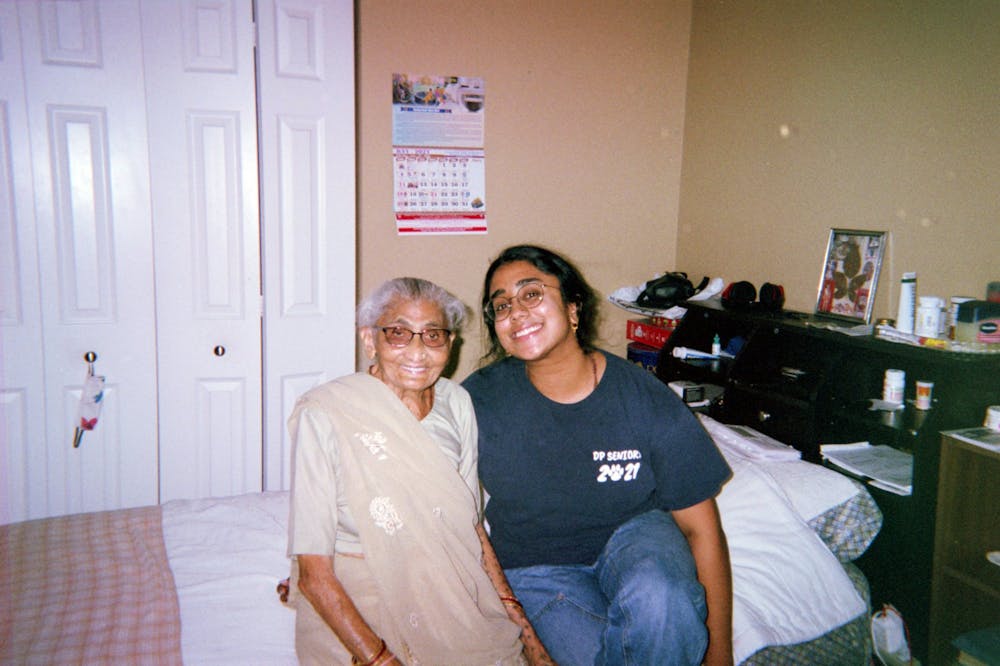
My grandma, my baa, is the strongest, most beautiful woman I know. She married young, didn’t finish school and immigrated from India with her six children. We jokingly called her a family man. She made time for her 14 grandchildren, spent her days calling each of us before and after school and would ask for updates on our well-being and our friends. She was, and continues to be, my dearest friend.
Not only did she teach me how to be a good friend, baa taught me how to love. Her hands had the power to make people feel good, feel accepted and feel at home. She would always run her wrinkled hands, scattered with sun spots and tattoos, up my arms and give a gentle squeeze to my shoulders.
As weird as it sounds, nothing in this world can bring me more comfort than my grandmother’s hands.
Near the end of her life, my grandma suffered from vision loss; however, every visit to Illinois began with me quietly sitting in front of her wheelchair, waiting for my grandpa to guide baa’s hands to my face. She would trace the outline of my lips, make divots near my smile lines and run her pointer fingers over my closed eyes. She would immediately feel my nose stud, taking a minute to pause and smile before recognizing the grandchild who sat in front of her.
My grandma’s hands quickly became her way of continuing to love. She would sit on her spot near the couch and would wait for someone to sit next to her before engulfing their hands into her own, periodically squeezing each finger and knuckle. I would be waiting with anticipation before getting to see her, excited to run my hands over hers and feel her place her palm over my head.
Perhaps my grieving started years ago. I would spend my summers pushing baa’s wheelchair on walks and describing the neighborhood kids riding their bikes, remembering how my cousins and I would do the same years ago. Winters meant I would get the chance to gently push her hair behind her ears, tie her scarves and massage her feet while we spent holidays and birthdays crowded around her bed.
I didn’t know grief could grow, but now that she’s gone it swallows me whole. In my head, she was always going to stick around; it felt like she was older than time itself. The day she died, I remembered the sound of her shuffling her slippers, the memories of her gingerly pouring out her afternoon tea. I remembered her being there for my brother’s first steps, and being there for me during my medical emergencies. But most importantly, I remembered her as the second mother who raised me, and when the time came to take care of her, I remembered her as the embodiment of all the love she had given me.
And so, it only feels appropriate to end this with a message to her:
To my old lady,
I don’t know if I will ever learn to live in a world without you, baa. I will forever think about sticky summers with you in Illinois when we would spend days looping around the neighborhood on scooters and bikes, and we’d return home to you and dada making a bowl of hot noodles and watered-down lemonade.
Days were spent lying on the floor, cramped in your room, trying to breathe through the humidity. We would fill the time playing cards and carrom, sitting elbow-to-elbow at the dining room table. No matter the heat, this was our daily routine, and it’s a routine I will forever cherish. You showered your grandkids with presents and candy, but the greatest gift you gave us was an unshakable sense of compassion. You believed in love, loving people and the world even when it wasn't returned because, for you, love knew no bounds.
I’ll never again hear the sound of you calling our names to fold laundry, or watch you adjust your red scarf before sitting and letting us take pictures of your tattooed arms or hear another of your stories, but lying in the grass midst Chicago summer afternoons will always remind me of these moments.
I miss you baa, and the world will miss you into infinity.
Aashi Mendpara is a junior from Orlando, Fla. studying Neuroscience and Anthropology.





